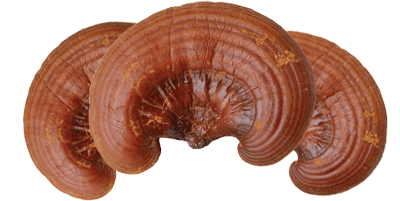
Reishi
Main Ingredients: Triterpenoids, Polysaccharides
Geographical Spread
Reishi is a large, dark-colored amanite (mushroom) with the scientific name Ganoderma lucidum. It is mainly found in tropical climates, but also in Europe and North America and grows on wood. Its role is to degrade it and for this purpose it has specific enzymes that catalyze the degradation reactions of the complex compounds contained by wood.

Historical Features
Based on recent studies, Ganoderma lucidum has several pharmacological properties, such as antimicrobial, antiviral, antiallergic, immunomodulatory, anti-inflammatory while it helps combat obesity (Hu, et al., 2017). In addition, research is being carried out to determine whether it prevents cancer cell proliferation in certain types of cancer, with remarkable results (Zhang, 2017).
Pharmaceutical Use
The name of the genus, Ganoderma, derives from the Greek words 'gano' and 'derma', which means the skin that shines. This genus has been well described since the 19th century, mainly for its European species, while in America it was "explored" by Murrill at the beginning of the last century. It has been used for a long time in traditional medicine in China, Japan and other Asian countries where it is used to ensure wellness and longevity and was known as "The Secret of the Emperors".

Phytochemical Composition
Ganoderma receives its nutrients from the degradation of wood and the processing of the complex chemical components contained therein (Hu, et al., 2017). It contains many active ingredients including triterpenoids (such as ganoderic acids) and polysaccharides (such as beta-glucans) that are potentially material for future study in the immune system (Wang, et al., 2017).
- Hu, Y., Ahmed, S., Luo, B., Gao, Z., Zhang, Q., Li, X., & Hu, X. (2017). Improved ganoderic acids production in Ganoderma lucidum by wood decaying components. Nature Scientific Reports.
- Wang, Y., Liu, Y., Yu, H., Zhou, S., Zhang, Z., Wu, D., . . . Zhang, J. (2017). Structural characterization and immuno-enhancing activity of a highly branched water-soluble β-glucan from the spores of Ganoderma lucidum. Carbohydrate Polymers, 337-344.
- Zhang, Y. (2017). Ganoderma lucidum (Reishi) suppresses proliferation and migration of breast cancer cells via inhibiting Wnt/β-catenin signaling. Biochemical and Biophysical Research Communications, 679-684.


